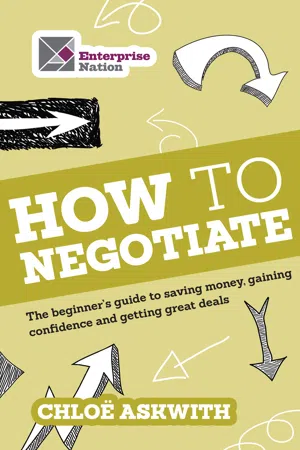
How to Negotiate
The beginner's guide to saving money, gaining confidence and getting great deals
- 55 pages
- English
- ePUB (mobile friendly)
- Available on iOS & Android
How to Negotiate
The beginner's guide to saving money, gaining confidence and getting great deals
About this book
This is a practical and insightful book to give new business owners the tools to save money and become confident negotiators. Find out exactly what you want from each deal and the go out to get this in a considered, considerate way that protects and grows long term business relationships.Negotiation is an essential skill for business owners, one which is sometimes overlooked. The benefits of being able to negotiate well are significant and extend beyond business life. Besides being able to save money, you will be able to improve other aspects of your deals which may include payments, delivery, volumes, quality, you may get other benefits such as marketing support and you should gain some extra friends! Knowing exactly what you need to achieve and making a plan of how to go about it will certainly improve your confidence when dealing with suppliers, and will give you and your company a professional edge.This book takes you through all the steps necessary for good negotiation. Starting with some golden rules which ensure that you don't rush into a deal or make mistakes, we will to make sure you understand what you are wanting to achieve and then ensuring that you understand the needs of your supplier or customer to get to a 'win-win' situation. The book highlights the importance of building long term relationships and it gives tips on meetings, what to wear, language to use and body language to be aware of.You will learn:- How to carry out research into your market- How to find many ways to save money- To understand how to structure deals that will benefit you- To communicate clearly with your suppliers and customers- What to expect at business meetings- How to keep discussing a deal until it is right for you (and your supplier)- The importance of relationships- How to feel confident even in difficult situations- Negotiating skills you learn never fail to stand you in good stead when you are in discussions at home or work.
Frequently asked questions
- Essential is ideal for learners and professionals who enjoy exploring a wide range of subjects. Access the Essential Library with 800,000+ trusted titles and best-sellers across business, personal growth, and the humanities. Includes unlimited reading time and Standard Read Aloud voice.
- Complete: Perfect for advanced learners and researchers needing full, unrestricted access. Unlock 1.4M+ books across hundreds of subjects, including academic and specialized titles. The Complete Plan also includes advanced features like Premium Read Aloud and Research Assistant.
Please note we cannot support devices running on iOS 13 and Android 7 or earlier. Learn more about using the app.
Information
1. What is Negotiation?
- how you can benefit from negotiating
- the preparation you need to do before you start discussions
- how to get started, with a step by step guide to how to get a good deal
- what to expect when negotiating
- how to continue by maintaining strong relationships with your clients
- tips on language to use, what to wear and what to do in meetings.
2. How Will You Benefit?
Save money
Feel confident
Make friends
Gain respect
- decide how you will communicate (by phone, email or in person)
- draw up forms for your proposals and deal memos
- mark opportunities to send thank-you cards and gifts
- decide whether to be formal or relaxed in the way you communicate.
3. Just Before We Get Going . . .
Some Golden Rules
1. Listen
2. Communicate clearly
3. Ask questions
- start off by telling them a bit about your circumstances, in a friendly way; try to engage the person on the phone
- ask them what their company is like, how long they have been around
- ask them if they have been working there for a long time
- ask them where they are based
- ask whether you can go and see them.
4. Become a negotiator
Table of contents
- Cover
- Publishing details
- About the Author
- Introduction
- 1. What is Negotiation?
- 2. How Will You Benefit?
- 3. Just Before We Get Going . . .
- 4. Take Action 1: Do Your Research
- 5. Take Action 2: Work Out What’s Really up for Discussion (Your ‘Variables’)
- 6. Take Action 3: Work Out the Deal You Would Like
- 7. Take Action 4: Negotiate
- 8. Take Action 5: Agree a Deal
- 9. Communication Tips
- 10. Sales Techniques and How to React to Them
- 11. Meetings
- 12. What to Wear and Body Language
- 13. Keep Those Relationships Going
- 15. Your Profit Margin and Cash Flow
- 14. The Language of Negotiating
- 16. Steps to Successful Negotiation
- 17. Useful Links and Worksheets
- Great business reads from Enterprise Nation